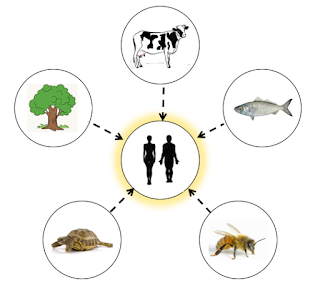No one to blame? Ways of erasing those responsible for environmental issues (Part I)
By Rodrigo Cáceres
In the English language (also in French and Spanish) there are several ways in which one can suppress grammatical agency. Within a sentence, grammatical agency refers to the presence of the subject that carries out the action of the verb. For example:
"She broke the glass" ⇒ "The glass broke"
In the left sentence, one can identify the subject "She" who carries out the action. However, one of the ways in which we can suppress the subject is through the passivization of a sentence. So, in the sentence to the right, the subject was effectively erased. In it, we might infer that one of two things happened: whether "somehow" the glass was broken or "somebody" must have broken the glass. However, we cannot know which of those happened. Therefore, whatever or whoever is responsible for the act has disappeared.
To make things really concrete, let's take a look at a statement from the IPBES (Intergovernmental Panel on Biodiversity and Ecosystem Services) chair, Sir Robert Watson, from a couple of days ago concerning the new IPBES report:
” The health of ecosystems on which we and all other species depend is deteriorating more rapidly than ever. We are eroding the very foundations of our economies, livelihoods, food security, health and quality of life worldwide.”
First, let's find the passivized sentence. Here it is: "The health of ecosystems [...] is deteriorating". Just as with our previous example, we can see there is no agent that carries out the action (deteriorating), thus nothing is ultimately responsible for the deterioration: the agent is absent. We might infer that ecosystems must have been deteriorated "somehow" or by "somebody", but we cannot really know.
In the following sentence (We are eroding...), a new agent appears: "We". If we think about it, the link between both sentences is not explicit nor straightforward, since the only thing that binds them is this "We" subject (highlighted in red). If this common "We" was absent, both sentences could be thought as independent and non-related.
Thus, only if we want to connect both sentences, first we need to make an inference that the "health of ecosystems" is equivalent to what is represented as "foundations" (highlighted in blue). Subsequently, only if we accept this inference, then we can infer then that "We" is the agent responsible for the deteriorating health of ecosystems.
This mode of speaking can be truly problematic because, as we can note, the sentences used are filled with indirect links and they ask for inferences rather than for literal interpretation. It is the responsibility of a communicator such as the IPBES chair to deliver straightforward, explicit messages about the current situation.
More importantly, I have already written on very important problems and negative consequences that arise when attributing responsibility to generic and indeterminate subjects such as "We", "Humans", "Human society" or "Humanity" as causes of environmental issues. You are more than welcome to read about it here, and for a more theoretical essay, you can take a look here.
Thus, only if we want to connect both sentences, first we need to make an inference that the "health of ecosystems" is equivalent to what is represented as "foundations" (highlighted in blue). Subsequently, only if we accept this inference, then we can infer then that "We" is the agent responsible for the deteriorating health of ecosystems.
This mode of speaking can be truly problematic because, as we can note, the sentences used are filled with indirect links and they ask for inferences rather than for literal interpretation. It is the responsibility of a communicator such as the IPBES chair to deliver straightforward, explicit messages about the current situation.
More importantly, I have already written on very important problems and negative consequences that arise when attributing responsibility to generic and indeterminate subjects such as "We", "Humans", "Human society" or "Humanity" as causes of environmental issues. You are more than welcome to read about it here, and for a more theoretical essay, you can take a look here.
As a personal opinion, I don't really think that this kind of language (using passivization and mass nouns) is intentionally used to conceal those responsible or to individualize guilt for environmental issues. It seems to me that these forms of language have become ingrained in the ways that scientists and journalists write, talk and think about environmental issues at large.
Whenever the headlines of most newspapers spread passivized sentences such as "One million species are threatened of extinction", then the causes responsible for this situation are systematically erased from discourse.
You can continue with the second part of this post over here!
Whenever the headlines of most newspapers spread passivized sentences such as "One million species are threatened of extinction", then the causes responsible for this situation are systematically erased from discourse.
You can continue with the second part of this post over here!
References
Schleppegrell, M. J. (1997). Agency in environmental education. Linguistics and Education, 9(1), 49-67.





Comments
Post a Comment